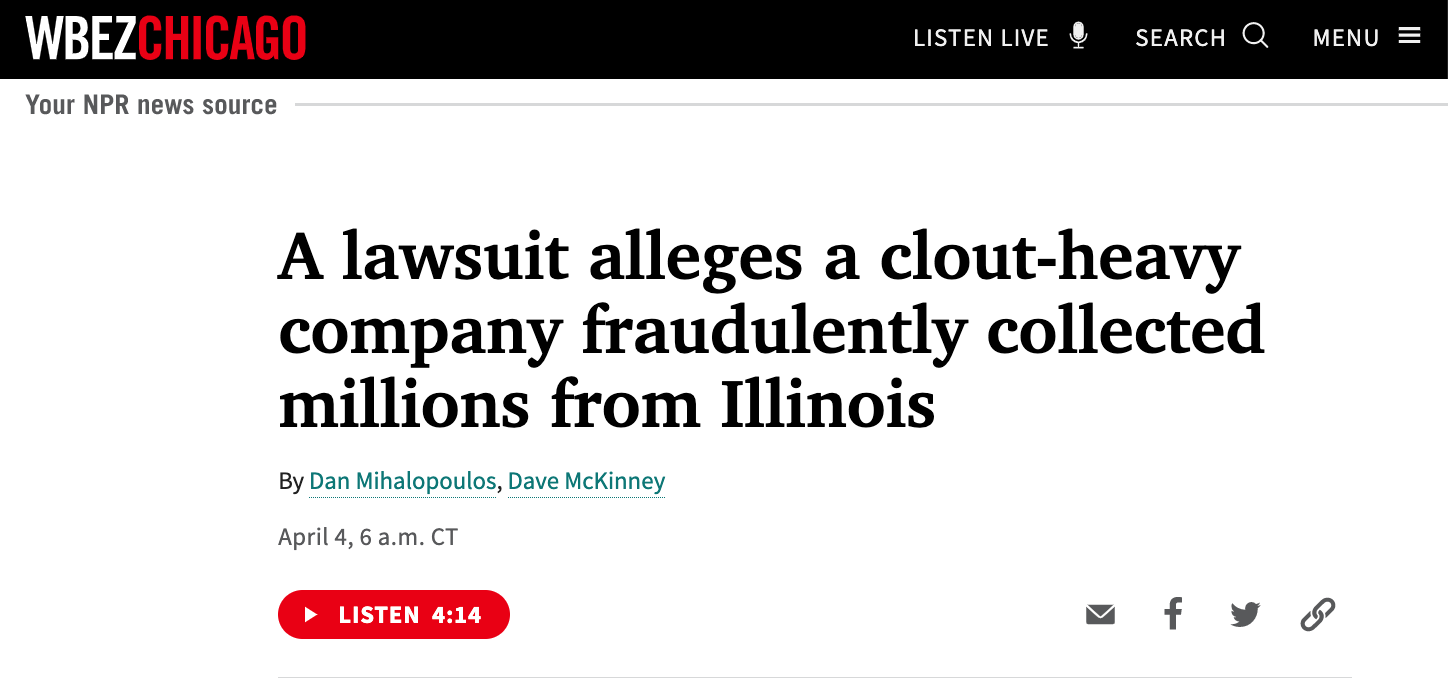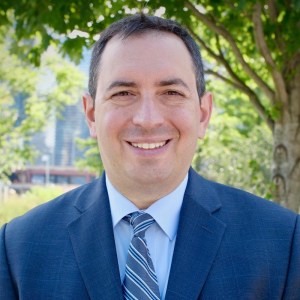WBEZ investigation explores fraud allegations against Illinois company

On April 4, WBEZ, Chicago’s NPR-affiliate, published an in-depth investigation into allegations that a company led by a politically connected lobbyist bilked Illinois taxpayers out of millions of dollars through a controversial state program that allows private companies to buy state debt.

The news outlet’s story, reported by Dan Mihalopoulos and Dave McKinney, explores accusations against the company, Vendor Assistance Program, in a newly unsealed whistleblower lawsuit that claims the state has been victimized by fraud.
But the investigation also draws heavily from court records Reporters Committee attorneys, along with attorneys at Saul Ewing Arnstein & Lehr LLP, helped WBEZ unseal two years ago stemming from an earlier lawsuit filed by VAP investors. Those records revealed new information concerning the company’s finances and depositions of the CEO about the company’s campaign contributions to Chicago politicians.
WBEZ used all of the unsealed court records to shine a spotlight on the Illinois debt program as state officials consider bringing it to a close. To learn more about WBEZ’s investigation, we recently spoke to Mihalopoulos about the origins of the story, how RCFP attorneys helped and the significance of the records WBEZ ultimately obtained through litigation.
(This interview has been edited for length and clarity.)
How did you start investigating this story?
There’s been a lot of controversy about this program in Illinois, a state that has a lot of financial problems. [The state] had billions and billions of dollars in unpaid bills to state vendors, and others that were owed money by the state. And so [state officials] came up with a program about 10 years ago where private companies would be approved to pay the bills and then those companies would later collect the late fee.
And this became an issue originally in a significant way during the 2019 race for mayor of Chicago. There was one candidate, who was the city clerk at the time, who had gotten a lot of campaign contributions from the people involved in this program. Also, one of the co-founders of VAP, the biggest player in the in the state program, was very close to a member of the Chicago City Council, who has since become ensnared in a corruption scandal.
So we were looking at this program, both because it’s part of the state’s financial problems and also because of the connections between people involved in the company and the mayoral candidate. In the course of doing reporting on this company in this program, we learned about a lawsuit involving investors in the program in Philadelphia.
Why did you decide to reach out to the Reporters Committee to help unseal the court records?
So I was looking into this lawsuit in Philadelphia, between the investors in this company that has been paid hundreds of millions of dollars by the state for its involvement in the program. In the course of looking at these documents on the federal electronic court record system called PACER, we realized that a number of documents were under seal, and that some of them could be unsealed if we had somebody go into court on our behalf in Philadelphia.
I contacted our Freedom of Information Act lawyer, Matt Topic, and I explained the situation to him, and he referred me to the Reporters Committee for Freedom of the Press. [RCFP attorneys] basically asked me to explain this situation and why we’re interested in this. It was a very happy day when they told me that they would be taking our case, and that they would be entering an appearance on our behalf and filing a motion to intervene.
What happened when you took the case to court?
There was opposition. The parties involved argued that we misrepresented the nature of the program. The parties in the case, who didn’t want the records unsealed, said it was confidential, proprietary business information.
Our lawyers at RCFP, and those who worked with them in Philadelphia, argued very effectively about the public interest in the matter. They also emphasized that we’re a news organization, and we’re trying to look out for the interests of the public in Illinois, particularly as we’re public media. It was a really, really good job that was done by the lawyers that represented us in this case. Very quickly, within a matter of a few months, we prevailed in court — the judge in the case sided with us and ordered the release of those documents.
What new information did you get from the records?
Well, we got a lot of things that we detailed in the story that we just published. As you can see from the story, this company, and this program continues to be very controversial in Illinois.
It was very interesting to get basically two different kinds of documents unsealed. One were internal audits of the company that’s involved in the state program. Those records showed not only what they’re getting paid by the state, which is a matter of public record, but it showed their expenses, and ultimately what their net income was. In 2017, it was something on the order of $23 million.
The second thing that we got out of this was a number of excerpts from depositions of the CEO of the company and other people who were involved in the company. We learned from these depositions the questioning that they faced about those campaign contributions from 2019 to the mayoral candidate, which she had to return to the donors after our stories in 2019. We also learned about a number of other people, Republicans as well as Democrats, who were working for the company.
Essentially, we would say that we found out a lot more about the financial aspects of this company that’s involved in a big state program, and we found out a lot about the political connections of that company. And all of that was thanks to the efforts of RCFP, and their successful intervention on our behalf in that lawsuit to get those federal court documents unsealed.
I really, really appreciate what RCFP did. And I think [Reporters Committee attorneys] Josh [Moore] and Katie [Townsend], and everyone involved, did an excellent job of digesting and simplifying what could be a very complicated matter. It was a lot of work, obviously, by a lot of people. And we’re deeply, deeply appreciative of what RCFP did here and what they do, in general, on behalf of journalists and the democratic societies that we serve.
Why did you decide to publish the story now, nearly two years after these records were unsealed?
The story needed some sort of news peg. That presented itself with a whistleblower lawsuit, which was filed quite a while ago, but was only unsealed itself recently. We always had in the back of our minds that we were looking for the opportunity to do a story with the details that were unearthed by the efforts of RCFP.
But honestly, we were looking for that news peg, which came when this whistleblower lawsuit was unsealed. Then we decided to do that all in one big story, rather than some smaller stories that we might have, you know, published sooner.
The Reporters Committee regularly files friend-of-the-court briefs and its attorneys represent journalists and news organizations pro bono in court cases that involve First Amendment freedoms, the newsgathering rights of journalists and access to public information. Stay up-to-date on our work by signing up for our monthly newsletter and following us on Twitter or Instagram.